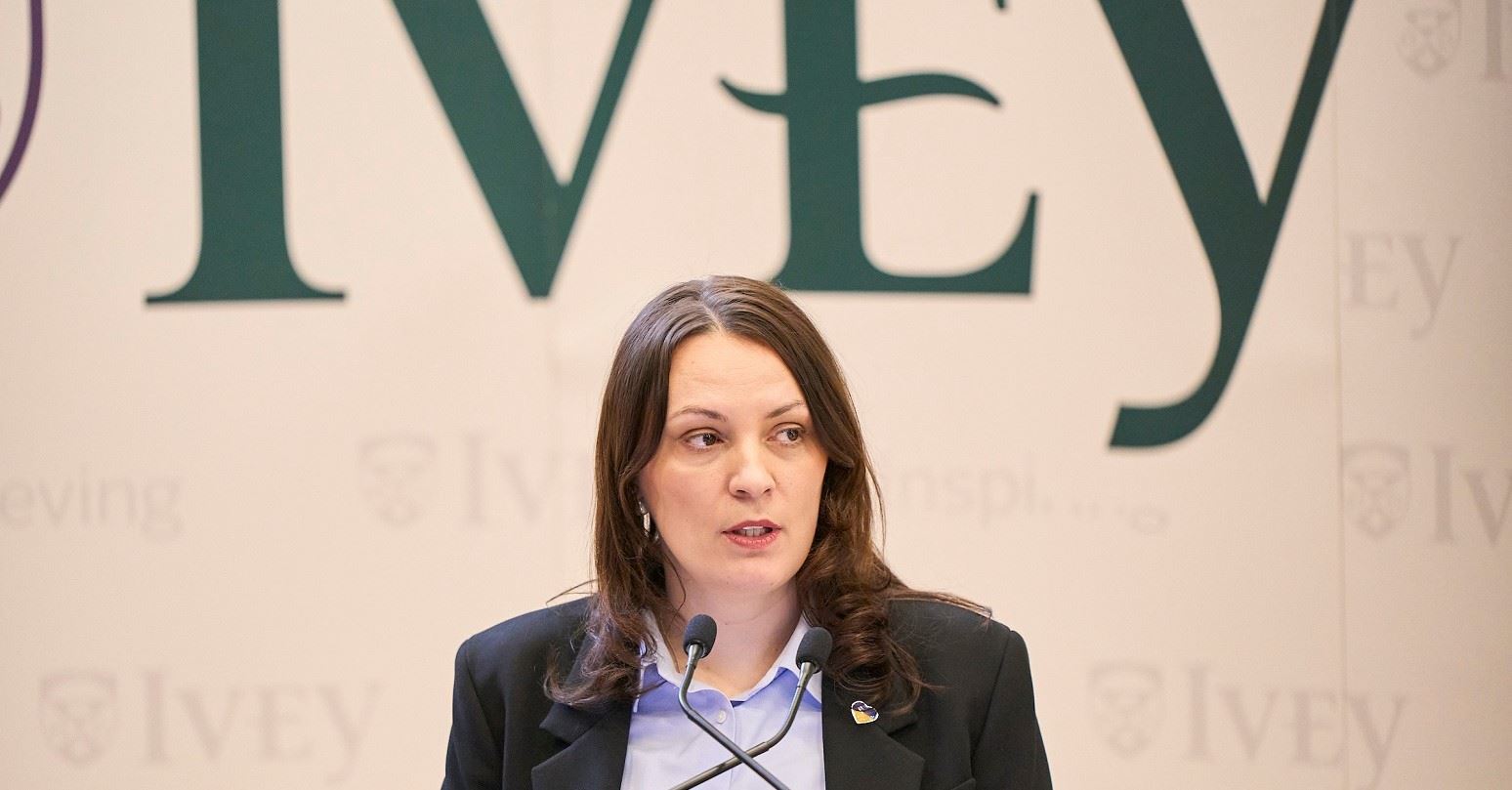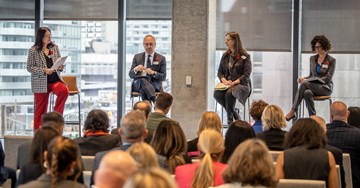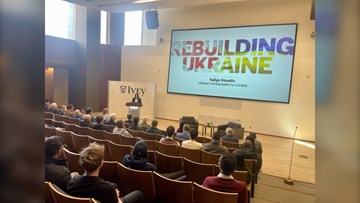Detailing how industrial facilities are reopening, grain exports are rising, and the economy is slowly – but surely – recovering, Yuliya Kovaliv, Ukraine's Ambassador to Canada, says she’s optimistic about Ukraine’s future amidst one of the largest rebuilding efforts in history.
“There is another front, which is the economic plan, and it’s just as important as the military front,” Kovaliv told a group of students, faculty, staff, politicians, and other community members at a recent event at Ivey entitled Rebuilding Ukraine.
The discussion, which included an address from Kovaliv and a Q&A session with Ivey’s Romel Mostafa, Director of the Lawrence National Centre for Policy and Management, focused on how Canada can help Ukraine to rebuild within the agriculture, infrastructure, energy, and knowledge sectors.
It was a fitting event for Ivey given the School’s commitment to Ukraine, which has included everything from leadership training of Ukraine’s soldiers to offering displaced Ukrainian graduate students free access to Ivey’s MBA program on an exchange basis.
In fact, Kovaliv cited the importance of an ongoing partnership between Ivey’s Ian O. Ihnatowycz Institute for Leadership and the Center for Leadership at Lviv Business School in Ukraine in educating future leaders who can contribute to rebuilding efforts. Noting that roughly seven million people have already fled Ukraine during the war, she said recouping that human capital is the foundation for Ukraine’s recovery.
“We are building together the competence because we need to be better … As Ukrainians, leadership matters. I've learned that the three main pillars that you're learning here are character, competence, and commitment … And we share that,” she said. “We need strong people in government … and there needs to be well-educated people who can deliver. That’s what we’re continuing to invest in. And that's where this partnership between the universities – between the programs – is so important.”
Resilience and the road to recovery
While acknowledging that damage from the war is staggering, with the World Bank estimating total reconstruction costs over the next decade at $486 billion, Kovaliv said Ukraine has proven resilient and is recovering faster than expected due to five key drivers of growth:
- The rapid rebuilding of infrastructure, such as roads, bridges, and utilities;
- Growth of the agriculture sector, particularly grain exports;
- Climate-friendly renewable energy projects to replace lost gas imports;
- A vibrant tech ecosystem, especially in the defence tech sector; and,
- Expansion of the defence industry.
Kovaliv said Ukraine’s quests for NATO and European Union memberships are also significant steps toward securing a better future.
“It means that post-war, Ukraine will be in a totally different position. Our motto to rebuilding is ‘rebuilding better,’” she said. “A lesson learned is that you need to do some things that nobody expects from you, especially in a position when you’re just surviving – you’re fighting for survival.”
Having support from international partners, such as Canada, is also essential to rebuilding, says Kovaliv. She noted one of Ukraine’s most strategic war-time partnerships is with Canadian uranium company Cameco Corporation, which has played a crucial role in supporting Ukraine’s energy independence in the nuclear sector. She also mentioned Canada’s contributions to strengthening mental health support in Ukraine, particularly for post-traumatic stress disorder treatment for veterans struggling with the trauma of war.
Stronger together: The importance of international cooperation
“If we want to rebuild Ukraine, it’s not only about the money. There needs to be more engagement business-to-business and government-to-business,” she said. “I think if we look at our Ukrainian-Canadian relationship, there is one field out of all that has huge potential to develop and that is our economic cooperation. We’ve started that with examples like Cameco … It’s an example that you can do business with a country even during war time.”
Describing how small- and medium-sized enterprises are the backbone of Ukraine’s economy, Kovaliv also told of efforts to reduce red tape, increase the inflow of private capital, and make Ukraine more attractive for foreign investors.
Above all, Kovaliv called for future leaders to consider the potential to reignite Ukraine. It’s a message that Ivey Dean Sharon Hodgson said has not been lost on the Ukrainian students at Ivey.
“I’ve been inspired by the many students who told us they wanted to return to Ukraine to help to rebuild after they finished their studies,” she said. “For many of the students, the choice to leave their homeland and come to Canada was incredibly difficult. But they made the most of this experience, embracing their learning and discovering practical applications for their learning in the future. I don’t think we were prepared for how these students came into our community and enriched our lives.”



